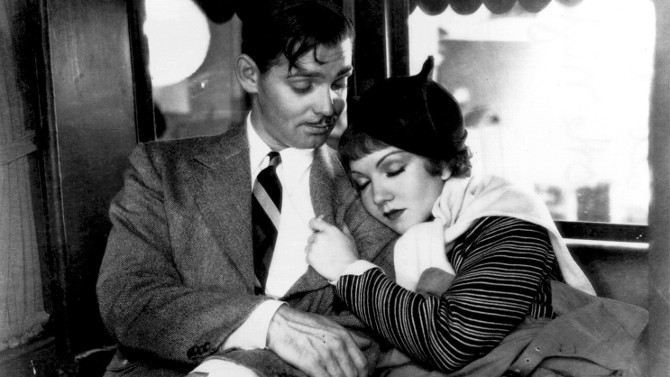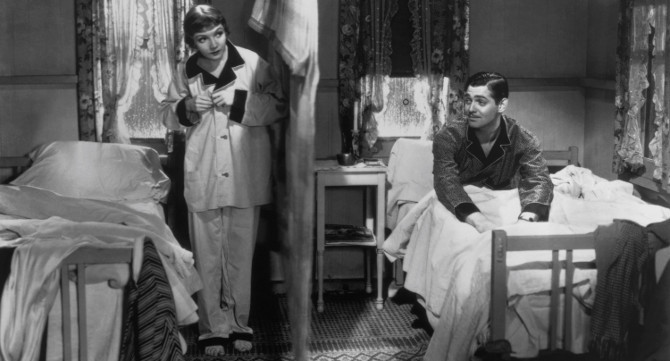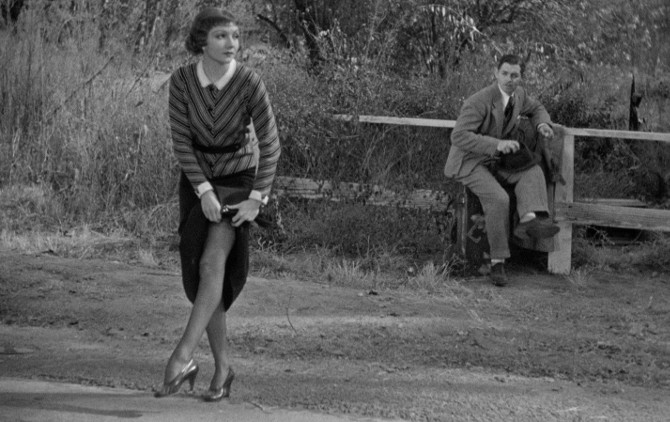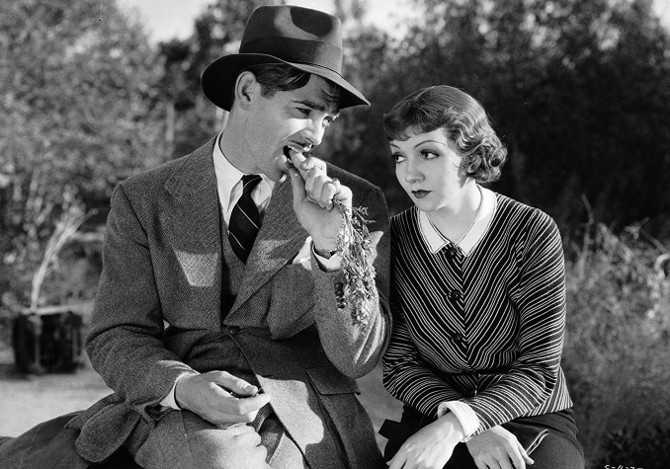It Happened One Night. . . what, you must be wondering? Well, on February 27th, 1935, at the 7th Academy Awards, the aforementioned film became the first ever to win the so-called ‘Big Five’ – Best Picture, Best Director (Frank Capra – his first of three wins for this category in the decade), Best Actor (Clark Gable), Best Actress (Claudette Colbert), and Best Screenplay – in this case, Adapted (Robert Riskin – based on the short story “Night Bus”). . . a rare feat that has only been replicated twice more (with 1975’s One Flew Over the Cuckoo’s Nest and 1991’s The Silence of the Lambs).
Often referred to as the first great romantic comedy as well as the first screwball comedy, all of this success and glory was not guaranteed. Capra, a director at Columbia Studios. . . a name that, at the time, equated to ‘Poverty Row’, was not known as a major studio. In fact, it was where the major studios sent their actors as punishment, or as a way to cut costs when they weren’t working. . . it is still disputed as to which brought Gable to the film (some reports claim that it was for refusing to do a specific film, others due to the fact that he’d had an affair with star Joan Crawford), though today, historians suggest it was simply a way for the studio to save some money. As for Colbert (whose very first film was with Capra – a disaster), he offered to double her salary (a whopping fifty thousand) and have the film shot in just four weeks, so that she could still go on her well-planned vacation. Over the twenty eight days, she complained nearly all the time. . . on the final day of shooting, exclaiming to a friend, “I just finished making the worst picture I’ve ever made”. Even Gable, who reportedly got along much better with Capra, was rather dower on his first day – “Let’s get this over with”. . . and was drunk, rude, and angry upon his first meeting with the director (after all, it wasn’t exciting to be on ‘Poverty Row’).
Neither star truly grasped Capra’s vision and spirit, and funnily enough, neither did Columbia. Lacking just as much of an understanding of what they had, it did not get the fanfare most films received. . . and did not get the advertising push you would expect. Falling away from the main theatres in a very short time, it was then released into the secondary theatres where audiences found it. Despite getting nearly no aid, it became a huge success, Columbia’s highest grossing picture for some time (and lifting it out of ‘Poverty Row’), and the largest moneymaker of the year for any studio. Then, it swept the major categories at the Oscars – both Gable, and more importantly Colbert, thanked Capra (Colbert in a sly way acknowledging that she was wrong) – in fact, she was so sure she was going to lose, she didn’t attend (instead, leaving for another trip). Studio head Harry Cohn sent someone to fetch her, and she rushed to the ceremony – accepting the Oscar in a travelling suit (one of the cutest pictures – as it was presented to her by Shirley Temple), then returning back to the train – which was held for her (the perks of being a star who has just won an Academy Award).
So, what was it that, despite all odds, ensnared audiences? A loveable mixture of comedy, drama and romance, Capra always had the knack for building realistic and heartwarming characters. Ellen Andrews (Colbert) is a wealthy heiress. . . a constantly controlled daughter that, in her one rebellious moment, escaped the security team set in place by her father (Walter Connolly), happening to fall into the lap of pilot and adventurer King Westley (Jameson Thomas) – the pair eloping. Now back under the thumb of her father, she once again escapes (this time from his boat), her mission: to dodge the countless people her father has hired as she makes her way to her man. . . journeying from Florida to New York.
Sneaking onto a bus, her life will forever be changed when journalist Peter Warne (Gable) sits next to her. A shoot first and ask questions later guy (in regards to the way he talks) who is on the outs with his boss, he promptly realizes what is sitting right next to him – the story of a lifetime. Quickly getting the upper hand on the spoiled young woman, he tinkers and prods, teasing her for her lack of street smarts and haughty attitude.
A tightrope walk that is so very rarely pulled off, Capra takes the two on a fascinating journey, the first third of the film finding Warne in complete control. Then things switch, and Ellen starts to gain the upper hand. This format, combined with the fact that she starts to fall for him. . . and, uneducated in such things, throws herself at him (the wrong move), makes for a fascinating vision of both characters at their strongest, and at their most vulnerable – you will never find Gable less confident and in control (yet still somehow strong) nor Colbert’s cool, aristocratic manner fade away into a more vulnerable human being (both playing against type like never before or after). Capra, tinkering with gender norms, found the perfect pair to play the two leads. With an infectious chemistry, Gable and Colbert are just as comfortable hurling insults as they are laughing together. . . and they may just be best at riffing off of each other (so that she is not found). Aided by the way Riskin and Capra build their scenes (though he is not credited, there is no doubt Capra co-wrote this screenplay), they know how to build a gag. Most famously, there is the hitchhiking scene. After tooting his own horn, Warne tries to flag down a car – to no avail, only for Ellen to try her hand at it. . . or should I say foot – for she flashes her sexy leg, catching the eye of a male driver, getting them a drive on her first try.
Matched by Joseph Walker’s (Only Angels Have Wings; Mr. Smith Goes to Washington) glistening cinematography, the film features an almost glimmering sheen, that is, when we don’t get a moody silhouette of the pair as they lie in bed separated by the ‘Wall of Jericho’ – see the film and you’ll get the reference (not in the original script, its creation was a necessity – as Colbert would not undress on camera). Without a wasted scene, the movie moves at a brisk pace (as does the camera – which was still somewhat rare at this time), every moment there to showcase these two central characters, providing another dimension in their relationship, another moment to endear us to them.
A film that just seems to flow so very easily, that is the magic of Frank Capra. Caring about people and the everyman, It Happened One Night is the start of a staggering run for the director in which he would build on what he created here (the next dozen years would see him make such films as Mr. Deeds Goes to Town, Lost Horizon, You Can’t Take It with You, Mr. Smith Goes to Washington, Arsenic and Old Lace, and It’s A Wonderful Life. . . and this isn’t including the gargantuan efforts he made during World War II). Other things of note – the way in which Warne eats carrots while talking the talk, fused with annoying bus passenger Oscar Shapely (Roscoe Karns) calling Warne “Doc”. . . and the way in which the man is scared by Warne’s mafia story about boss “Bugs Dooley” was the inspiration for the creation of Bugs Bunny; watch for an entertaining cameo from Alan Hale Sr. as the driver who picks them up; while another interesting story found Gable struggling to take his undershirt off – going without one instead, this scene had such an impact, an urban legend claims that undershirt sales declined drastically following the film’s release. So, take this praised flourish of trumpets as a sign that this classic must be seen. . . it is a rare feat when everything comes together for a perfect union.






Yr own brilliant review and backgrounder induced me to view this striking 1934 movie. One senses the fact that Columbia was the poor kid on the block, but with nothing to lose they gave Capra his way and their actors the freedom of low expectations. By any standard, even today, the cinematography is striking. The plot is shallow but everyone is having a good time by the time the lights come up. Remember, we are already well into the Great Depression but there is always hope for the common Joe, even in depression America.
P.S. Always at 6s & 7s to find a streaming source for such productions, I went to my paid-up subscription on the Criterion Channel. They have the classy DVD version which they gussy up for Blu-Ray purchasers, but simple subscribers (that would be me) are not even offered the right to view the stream version, or even to pay extra. So where did I go? To a Russian streaming site, of course…